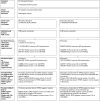Universal prevention of depression in women postnatally: cluster randomized trial evidence in primary care
- PMID: 20716383
- PMCID: PMC3042795
- DOI: 10.1017/S0033291710001467
Universal prevention of depression in women postnatally: cluster randomized trial evidence in primary care
Abstract
Background: To test whether receiving care from a health visitor (HV) trained in identification and psychological intervention methods prevents depression 6-18 months postnatally in women who are not depressed 6 weeks postnatally.
Method: The study was a prospective cluster trial, randomized by GP practice, with follow-up for 18 months in 101 primary care teams in the Trent area of England. The participants were women scoring <12 on the postal Edinburgh Postnatal Depression Scale (EPDS) at 6 weeks postnatally (1474 intervention and 767 control women). Intervention HVs (n=89, 63 clusters) were trained in identifying depressive symptoms using the EPDS and face-to-face clinical assessment and in providing psychologically orientated sessions based on cognitive behavioral or person-centered principles. The control group comprised HVs (n=49, 37 clusters) providing care as usual (CAU). The primary outcome measure was the proportion of women scoring ≥ 12 on the EPDS at 6 months postnatally. Secondary outcomes were mean EPDS score, Clinical Outcomes in Routine Evaluation - Outcome Measure (CORE-OM) score, State-Trait Anxiety Inventory (STAI), 12-item Short Form Health Survey (SF-12) and Parenting Stress Index Short Form (PSI-SF) scores at 6, 12 and 18 months.
Results: After adjusting for individual-level covariates, living alone, previous postnatal depression (PND), the presence of one or more adverse life events and the 6-week EPDS score, the odds ratio (OR) for EPDS ≥ 12 at 6 months was 0.71 [95% confidence interval (CI) 0.53-0.97, p=0.031] for the intervention group (IG) women compared with the control (CAU) group women. Two subgroups were formed by baseline severity: a 'subthreshold' subgroup with a 6-week EPDS score of 6-11 (n=999) and a 'lowest severity' subgroup with a 6-week EPDS score of 0-5 (n=1242). There was no difference in psychological effectiveness by subgroup (interaction term: z=-0.28, p=0.782).
Conclusions: This study provides new evidence of a universal, enduring preventive effect for depression in women who screen negative for depression postnatally.
Figures
Comment in
-
Care from health visitors trained in psychological intervention methods may prevent depression in mothers not depressed 6 weeks postnatally.Evid Based Nurs. 2011 Oct;14(4):128-9. doi: 10.1136/ebn.2011.100085. Epub 2011 Aug 17. Evid Based Nurs. 2011. PMID: 21852227 No abstract available.
References
-
- Barkham M, Margison F, Leach C, Lucock M, Mellor-Clark J, Evans C, Benson L, Connell J, Audin K, McGrath G. Service profiling and outcomes benchmarking using the CORE-OM: towards practice-based evidence in the psychological therapies. Journal of Consulting and Clinical Psychology. 2001;69:184–196. - PubMed
-
- Brugha T, Bebbington P, Tennant C, Hurry J. The List of Threatening Experiences: a subset of 12 life event categories with considerable long-term contextual threat. Psychological Medicine. 1985;15:189–194. - PubMed
-
- Brugha TS. Brugha T. S. Social Support and Psychiatric Disorder: Research Findings and Guidelines for Clinical Practice. 1st edn. Cambridge University Press; Cambridge: 1995. Social support and psychiatric disorder: recommendations for clinical practice and research; pp. 295–334. ), pp.
-
- Brugha TS, Bebbington PE, Singleton N, Melzer D, Jenkins R, Lewis G, Farrell M, Bhugra D, Lee A, Meltzer H. Trends in service use and treatment for mental disorders in adults throughout Great Britain. British Journal of Psychiatry. 2004;185:378–384. - PubMed
-
- Brugha TS, Morrell CJ, Slade P, Dixon S. Prevention of postnatal depression: cost-effectiveness of health visitor training; results from a cluster randomised controlled trial in primary care. Ninth Workshop on Costs and Assessment in Psychiatry. Quality and Outcomes in Mental Health Policy and Economics. Journal of Mental Health Policy and Economics. 2009;12:S8. (Suppl. 1),


